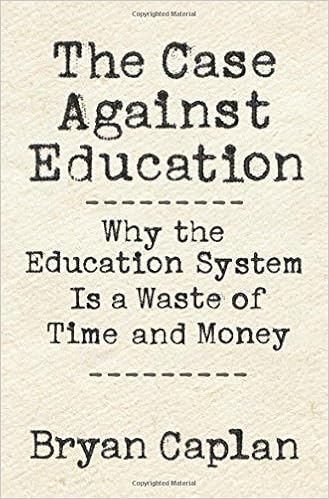
Libertarian economist Bryan Caplan didn’t strive for subtlety when he titled his new book The Case Against Education: Why the Education System Is a Waste of Time and Money. As I wrote in a Remarks column in the print edition of Bloomberg Businessweek, the George Mason University professor makes a strong case that most of what people learn in high school and college is unnecessary and quickly forgotten. He says that only about a fifth of the value of an education is the increase in human capital. The rest is “signaling”—the degree itself puts you in line ahead of non-graduates, even if you learned nothing useful, because it tells potential employers that you’re reasonably smart, reasonably determined to complete what you started, and reasonably good at fitting in. Signaling is a zero-sum game: possibly useful for the individual who gets ahead, but wasteful for society.
I recommend the book. Still, I can’t fully buy Caplan’s conclusion that the solution is to cut back drastically on taxpayer support for college, and even high school. Caplan disagrees with my disagreement. On the blog he shares with some other economists, EconLog, he called my article “fun and fair” but indicated that I had fallen victim to “social desirability bias” by arguing that society should bend over backward not to deprive lower-income strivers of the human capital that college does build. (He also made a fair point about my throwaway line concerning Sanskrit and cement mixing, and I agree with him, so set that aside.
Here’s Caplan:
Human beings like saying — and believing — whatever sounds good, even if what sounds good makes little sense. My question for Coy: If deleting 80% of the perceived social rewards of education makes you no more willing to cut public support for public education, what would? What if we deleted 90% of education’s perceived social rewards? 95% 99%? I know it sounds nice to say, “If it helps one person, it’s worth it,” but that’s crazy. No one spends their own money so casually — nor should they. Furthermore, you can easily use some of the budgetary savings to help “strivers” in more cost-effective ways. So why not?
So let me answer that question. I accept Caplan’s economics-y point that life involves trade-offs. If public support for education helped just one person while costing $1 trillion, it wouldn’t be worth it. Likewise, if Caplan could prove that wasteful signaling accounts for 99 percent of the value of education. But that’s not what he says. He says it accounts for 80 percent of the value of education. Some other economists put the ratio considerably lower—less than half. And reforms could further increase the amount of human capital that the education system creates.
In other words, education really does educate, even if it is overly expensive and not very effective. When you yank public funding from education, you are making it difficult or impossible for children who grew up poor or in the lower middle class to get the same access to learning that children of rich families take for granted.
As for Caplan’s idea of using some of the savings to help strivers in more cost-effective ways: Tracking low-income students toward vocational education because it’s all they can afford feels Dickensian. Libertarians such as Caplan stress individual liberty and minimal taxation. Most of us are a bit more communitarian, meaning that we’re more likely to think of society as a family. A family tries to give every child the very best shot at success, even when it is (overly) expensive to do so. If that’s what Caplan wants to call “social desirability bias,” so be it.
source:-.bloomberg
